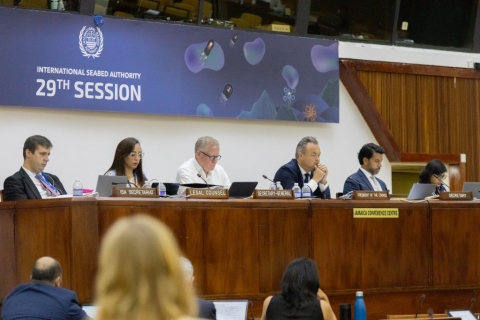
Progress made, but significant hurdles still remain, toward protections for the sea bed against exploitation by Deep-Sea Mining.
The following article was published in the September-October 2024 issue of NewsNotes.
The 29th International Seabed Authority (ISA) meeting, held in Jamaica in July, hoped to mark a significant advancement in the international governance of deep-seabed mining activities and protection of the oceans, the “lungs” of our planet. Its primary focus was the development of comprehensive rules, regulations, and procedures (RRPs) for the commercial exploitation of mineral resources from the seabed. Some progress was made towards this goal. However, disagreements persisted among member states regarding the pace and scope of these regulations, reflecting the complex interplay of environmental, economic, and geopolitical interests.
The Authority, made up of 168 member states, struggles to negotiate a balance between promoting economic development, protecting the marine environment, and ensuring that the benefits of deep-sea mining are distributed equitably among member states. To achieve these goals, the ISA is developing a regulatory framework that addresses the concerns of all stakeholders. The key point of contention is the balance between environmental protection and economic development. This highlights the contradictory role of the ISA as charged both with protecting the oceans and issuing licenses to exploit it through deep-seabed mining.
Thirty countries have called for a moratorium or pause on any exploitation until adequate research has been completed to determine the possible ramifications of seabed mining. These same countries advocate for stringent regulations to safeguard the deep-sea ecosystem, citing the potential for irreversible damage to vulnerable habitats and biodiversity. They emphasize the need for robust environmental impact assessments to ensure that deep-sea mining activities are conducted in a sustainable manner. Chile, Costa Rica, France, Ireland, and Monaco were among those countries that reiterated their national positions that commercial exploitation should not commence in the absence of appropriate RRPs that would guarantee the effective protection of the marine environment.
Conversely, most countries argued for a more aggressive approach that would allow for the development of a thriving deep-sea mining industry while minimizing environmental risks. These countries highlighted the potential economic benefits of deep-sea mining, particularly for developing nations, and emphasized the importance of striking a balance between environmental protection and economic development. Nauru and other countries on this side of the debate highlighted the need to achieve targeted milestones toward completing the draft exploitation regulations through a 2024-2025 road map. They sought support in progressing towards finalization of the RRPs by the 2025 meeting of ISA.
The complexity of the issue of deep-seabed mining was epitomized by some delegates questioning whether the draft exploitation regulations would apply to all three types of mineral resources (polymetallic nodules, polymetallic sulfides, and cobalt-rich ferromanganese crusts) or just to nodules. The ISA’s ability to effectively manage all these issues will be critical for ensuring the long-term sustainability of deep-sea ecosystems and the equitable distribution of the benefits of mining if it is allowed.
In addition, the meeting also addressed other issues related to deep-sea governance. Delegates were united in acknowledging the importance of corruption prevention. They discussed: expanding the regulation to encompass acts of bribery, threats, and extortion; explicitly outlining consequences of failure to comply; and whether contractors and relevant parties shall adhere to regional, national, and international laws related to anti-corruption and anti-bribery. A discussion took place under the regulation on restrictions on advertisements aiming to ensure that all public communications are factual, transparent, and do not mislead stakeholders or the public regarding ISA’s decision making.
Finally, delegates elected Leticia Reis de Carvalho, Brazil, as the new ISA Secretary-General. Her election was seen by some as a victory for those advocating for a more cautious approach. Her term commences the first day of the new year.
While the 29th ISA meeting was a significant step forward in the development of a global framework for regulating deep-sea activities, delegates are still pessimistic that the 30th meeting will be able to finalize regulations governing exploitation. They pointed to unresolved matters discussed by eight intersessional working groups, including issues such as effective control, equalization measures, provisions related to inspection, compliance, and enforcement, the rights and interests of coastal states, test mining, and intangible underwater cultural heritage.
So, while some progress was made at this 29th session of ISA, a great deal of work remains before reaching agreement on regulations governing deep-seabed mining, though a moratorium or pause is unlikely.
Photo of the 29th International Seabed Authority Conference in Kingston, Jamaica from the ISA Press Release.
